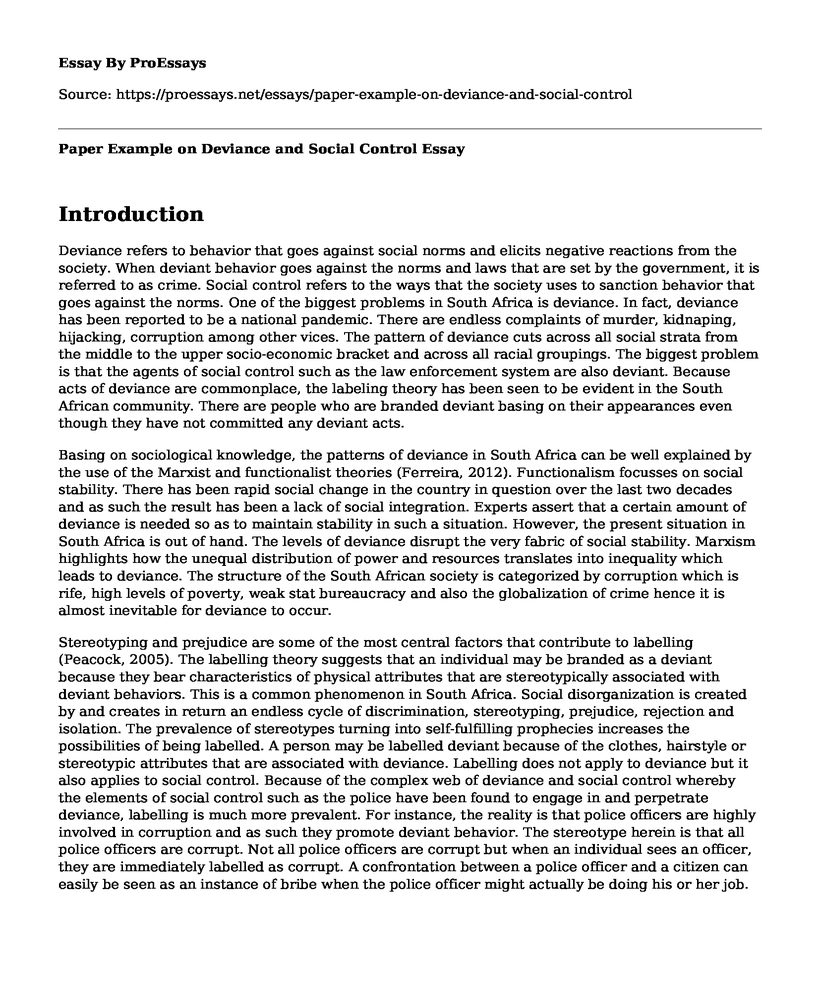Introduction
Deviance refers to behavior that goes against social norms and elicits negative reactions from the society. When deviant behavior goes against the norms and laws that are set by the government, it is referred to as crime. Social control refers to the ways that the society uses to sanction behavior that goes against the norms. One of the biggest problems in South Africa is deviance. In fact, deviance has been reported to be a national pandemic. There are endless complaints of murder, kidnaping, hijacking, corruption among other vices. The pattern of deviance cuts across all social strata from the middle to the upper socio-economic bracket and across all racial groupings. The biggest problem is that the agents of social control such as the law enforcement system are also deviant. Because acts of deviance are commonplace, the labeling theory has been seen to be evident in the South African community. There are people who are branded deviant basing on their appearances even though they have not committed any deviant acts.
Basing on sociological knowledge, the patterns of deviance in South Africa can be well explained by the use of the Marxist and functionalist theories (Ferreira, 2012). Functionalism focusses on social stability. There has been rapid social change in the country in question over the last two decades and as such the result has been a lack of social integration. Experts assert that a certain amount of deviance is needed so as to maintain stability in such a situation. However, the present situation in South Africa is out of hand. The levels of deviance disrupt the very fabric of social stability. Marxism highlights how the unequal distribution of power and resources translates into inequality which leads to deviance. The structure of the South African society is categorized by corruption which is rife, high levels of poverty, weak stat bureaucracy and also the globalization of crime hence it is almost inevitable for deviance to occur.
Stereotyping and prejudice are some of the most central factors that contribute to labelling (Peacock, 2005). The labelling theory suggests that an individual may be branded as a deviant because they bear characteristics of physical attributes that are stereotypically associated with deviant behaviors. This is a common phenomenon in South Africa. Social disorganization is created by and creates in return an endless cycle of discrimination, stereotyping, prejudice, rejection and isolation. The prevalence of stereotypes turning into self-fulfilling prophecies increases the possibilities of being labelled. A person may be labelled deviant because of the clothes, hairstyle or stereotypic attributes that are associated with deviance. Labelling does not apply to deviance but it also applies to social control. Because of the complex web of deviance and social control whereby the elements of social control such as the police have been found to engage in and perpetrate deviance, labelling is much more prevalent. For instance, the reality is that police officers are highly involved in corruption and as such they promote deviant behavior. The stereotype herein is that all police officers are corrupt. Not all police officers are corrupt but when an individual sees an officer, they are immediately labelled as corrupt. A confrontation between a police officer and a citizen can easily be seen as an instance of bribe when the police officer might actually be doing his or her job.
Conclusion
Crime is disproportionately committed by young males hence it is easier for any young male in South Africa to be seen as a deviant (Breetzke, 2010). Because of the increased crime rates being attributed to the influx of African migrants, a lot of prejudice and stereotyping as well as the xenophobic state of the country may lead to most African migrants being branded deviants with or without proof.
Reference
Breetzke, G.D. (2010). A socio-structural analysis of crime in the city of Tshwane, South Africa. South African Journal of Science 106, 11-12. Retrieved from: http://www.scielo.org.za/scielo.php?script=sci_arttext&pid=S0038-23532010000600014
Ferreira, R. (2012). Sociological explanations of crime, deviance and social control in a democratic South Africa. Retrieved from: https://www.researchgate.net/publication/268093648_Sociological_explanations_of_crime_deviance_and_social_control_in_a_democratic_South_Africa
Peacock, R. (2005). Victimology in South Africa. Pretoria, South Africa: Van Schaik Publishers.
Cite this page
Paper Example on Deviance and Social Control. (2022, May 22). Retrieved from https://proessays.net/essays/paper-example-on-deviance-and-social-control
If you are the original author of this essay and no longer wish to have it published on the ProEssays website, please click below to request its removal:
- Essay Sample on Pragmatics and Gricean Maxims
- Get Out: Analysis of Interracial Relationship and Family Dynamics
- Essay Example on Age No Barrier: The Internet's Impact on Society
- Nonverbal Communication: Facial Expressions, Gestures & More - Essay Sample
- Essay Sample on Stereotypes: A Danger to XXI Century Living
- Attractive Relationship Alt. Impacts Early Cognition & Self-Protection - Essay Sample
- Book Review Sample on Caucasia: Danzy Senna's Fictional Exploration of Race & Discrimination







